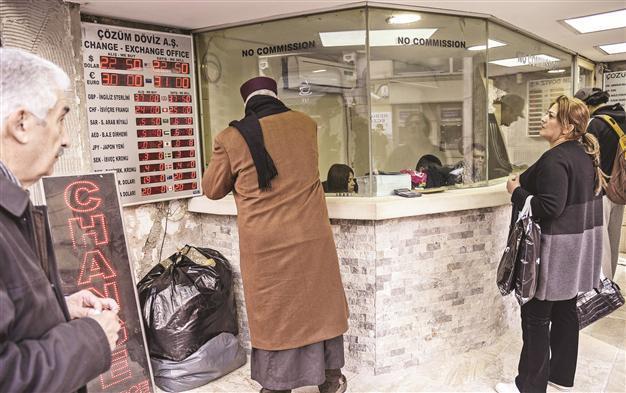Turks hoard dollars fearing lira rout will continue
ISTANBUL - Reuters

Customers wait for their turn at a currency exchange office in Istanbul. As the lira looks like it will not go back to its strong days any time soon, citizens who want to raise their savings’ value hoard billions of dollar. AFP photo
Turkish households and firms are hoarding dollars, suggesting they have little faith the lira will be spared a further emerging markets sell-off despite a massive rate hike this week.
The Central Bank raised interest rates by around 500 basis points at an emergency meeting on Jan. 28 despite Prime Minister Tayyip Erdoğan’s vocal opposition, stunning markets and causing a spike in the battered currency. But the lira has since erased much of those gains, returning to where it was just before the rate hike. It is still some way from Jan. 27’s record low of 2.39, however, trading at around between 2.24 to 2.27 to the dollar.
Locals’ forex holdings rose 2 percent to $122 billion in the week to Jan. 24, jumping 13 percent year-on-year, according to data from the Central Bank released on Jan. 30, suggesting they are not selling dollars as they did in the past in currency crises to benefit from a cheaper lira.
“Corporates have started buying forex for hedging purposes as they think the lira will not appreciate,” said a senior forex manager at an Istanbul bank.
“Moreover, individual investors and households - who used to sell as much as $10-15 billion whenever the lira depreciated - are hoarding dollars and even increasing their holdings, piling extra pressure on the lira,” he said.
“Locals continue to accumulate FX,” said Istanbul-based TEB-BNP Paribas strategist Erkin Işık, estimating Turks’ total forex holdings had risen some $5 billion in the past three weeks.
“It will be more difficult for the Central Bank to reverse this mood of local investors, if global risk sentiment remains weak,” he said.
Companies’ debt stressThe lira fell 17 percent in 2013 and extended its slide this year as a graft scandal hit the government, heightening investor concern about political stability just as a gradual end to U.S. monetary stimulus dampened appetite for emerging market assets.
The slump means Turks now need more than twice as many lira to buy dollars as they did at the currency’s peak six years ago, hitting their pockets as they prepare to vote in a cycle of local, presidential and general elections beginning in March.
The lira’s slide has also left Turkish firms with foreign debts badly exposed, forcing them to scrap some investments at a critical time as the government battles the corruption scandal and tries to revive economic growth.
Turkey’s leading business group TÜSİAD estimates that within just one month Turkish firms’ foreign debt has risen 25-30 percent due to the currency weakness and higher risk premiums which push up borrowing costs.
The higher borrowing costs have also raised concerns about banking sector profits. All this bodes ill for an economy which has seen growth rates of 9.2 percent in 2010 and 8.8 percent in 2011 shrink to just 2.2 percent in 2012 and a projected 3.6 percent last year.
